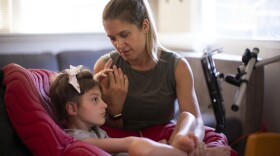





Straddling the Polish-German border are two towns that used to be one. The international line drawn at the end of World War II split it in half, and put one part in each country. Now the major division, the border, will begin to disappear when Poland joins the European Union next year. As NPR's Emily Harris reports, officials are working to reunite the towns -- but they keep running into history.
Five years ago, sociology professor Jota Blin got a job offer in Görlitz, a German town divided at the end of World War II. Görlitz lies on the Neisse River, just opposite the town that since 1945 has been Zgorzelec, Poland. When Blin moved to Gorlitz, she says, most of her West German countrymen considered it the end of the world. But in Blin's view, she simply went where Europe is going.
"I'm a pioneer," she says. "And you know in America everybody went west, to the wild west. And I was very motivated to go to the 'wild east.' Because I knew things would start moving here and this would be the door to a widened Europe and I wanted to be part of it."
That door will start to open next year, when Poland and nine other mostly-eastern nations join the European Union. Some in Görlitz share Blin's optimism -- but others compare the border to a door separating two rooms full of different levels of water. "If it opens too fast, people worry, some folks might drown," Harris reports.
On the German side, Clark Robbins worries he might lose out in the process. The Arkansas native left the United States decades ago. Now Robbins and his German wife run a printing shop in Görlitz. He worries he'll be undercut by businesses with lower costs across the border.
"If someone now earns here, let's say, five times, maybe 10 times what people earn 800 meters further east, then there is increased freedom for people to work here, or companies on the other side of border to deliver goods and services in this country," Robbins says.
There's already a lot of cross-border economic activity. For the past three years, German Oscar Gätch has walked more than a mile and crossed the border for a haircut in Zgorzelec. Polish women cut hair well, he says. And in Germany, it's more expensive -- more than three times the cost of a Polish haircut.
Lower prices in Poland reflect significantly lower average wages. Still, enough Poles earn enough to shop for high-end goods across the border. One German department store even accepts Polish zlotys along with euros.
But beyond shopping, the big question in these towns is jobs. Unemployment on the German side is actually higher. But 18-year-old German Ulrike Mäusel would never think of going east to look for work.
"In my opinion, Poland is a dangerous country where Germans just go to shop, to get some gas or to buy cheap cigarettes -- but never to stay for long," Mäusel says. "In Poland you have to watch out in every corner that they don't steal your car or your bike or whatever."
Like many Germans, Mäusel figures jobs in Görlitz will get snapped up by cheaper Polish labor once work restrictions are fully lifted over time. But at an internet café in Zgorzelec, 25-year-old Pole Marcin Swirski disputes that idea. If he leaves, Germany would not be his first choice, he says. He says he doesn't like Germany's rigorous laws: "It's not so equal to people from abroad."
His fear, common in Zgorzelec, is that rich Germans will come buy up his country.
Cross-border stereotypes are deeply rooted. Mario Ludwig is a Görlitz native who says he has no personal bias against the Poles. But growing up, he heard bad stories. Ludwig says his grandparents had to abandon their home in what was then Germany when the Russians swept forward to establish a new border. Few Germans would say they want that part of Poland back; but many remember it used to be theirs, Harris reports.
Leaders in both towns are trying to focus on the future. Emergency crews now practice rescues together and the two city councils meet regularly. But the pet joint project is a bilingual school.
After years of bureaucratic hassles, 28 Polish and German seventh graders are now studying together at a school in Görlitz. School director Andreas Kempe is optimistic.
"Our biggest goal is that people don't work against each other but for each other," he says. "The economic situation on both sides of the border is hard enough. I believe a project like this will help people become a little bit closer, and overcome their prejudices."
Kempe hopes his graduates will have enough cross border connections to build new history here.
Copyright 2022 NPR. To see more, visit https://www.npr.org.




